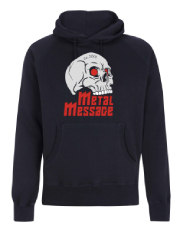

| Interview: | TRISTANIA |
| Title: | Completely open |
What a change! Once celebrated as highly exalted style-majesties with aesthetically dominated Gothic Metal gigantism, these Norwegians now show themselves from their probably harshest side so far.
From the swarmingly-playful and upliftingly arranged longing-sound of the beginning has left little to be desired on the new album „Darkest White“ .
Rather, this new publication reveals an exceptionally persistent Dark Metal formation, which is as disillusioned as it is resolutely countered by the oppressively gloomy zeitgeist. Not to be underlined by the authors, stationed in Stavanger, is that they are still willing to inject a great dose of emotionality into their creativity, despite all their musical self-esteem.
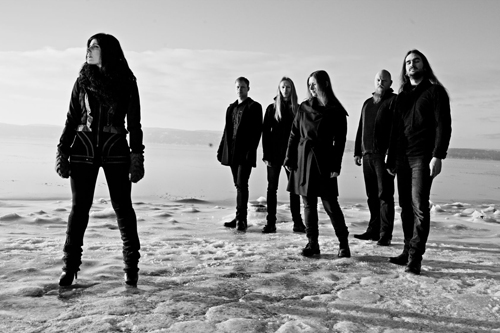 I talk to bass player Ole Vistnes.
I talk to bass player Ole Vistnes.
Please describe the main content of the new album!
„‚Darkest White‘ is best described as an uncompromising Metal album with strong melodic and atmospheric elements. It ́s an album that aims directly at the listeners heart and it involves the listener on an emotional level. What would first strike the listener I guess is the powerful, raw sound and hard hitting production. If the listener delves deeper into the album, it ́s clear that this attitude saturates everything, the songs, lyrics, recordings and mix. The main vibe of the album is dark and disturbing, but there are also room for serene beauty and majestic powerful elements.“
Please tell about the main lyrical content of „Darkest White“! One can become quiet curiously, while listening to the surprising raw songs...
„In general the lyrics of the album encompass themes such as having a confused deathwish or longing for something better on the other side, fear/fascination of what lies ahead, a wish to change the inevitable, and the feeling of pain, frustration and helplessness when realizing our own limitations, coming to terms with our own mortality. We are approaching the end; if not of the world, then certainly of our youth, of relationships, of our lives; and we start seeing the contours of the even darker (?) tunnel at the end of our spell on this earth. We want to be free but still dive into addiction, we want to be calling the shots but are still lured into submission.. by drugs, alcohol, bad relationships, jealousy, vanity, self-righteousness, power games, corruption and religion. We have - as far as we know - only one life, a withering bouquet of opportunities, a constantly dwindling future, and the certainty of death awaiting there behind one of those corners. The album title meaning I leave up to everyones own imagination!“
Which noteworthy differences to the previous Tristania songs are waiting now for the listeners?
„The most noticeable difference from ‚Rubicon‘ is the darker, more edgy feeling. It is more confronting, less polished, not easy to remain unaffected. I think that ‚Darkest White‘ insists that the listener make a stand, either you let yourself indulge in the mystic and captivating darkness, or you are repelled by the aggressiveness and brutal honesty. The atmospheric elements are much more sublime this time around, you have to dig a lot deeper to really discover many of the songs. In contrast to ‚Rubicon‘ and especially ‚Illumination‘, the new album demands a lot more from the listener. There are songs on here that will hit you instantly, with driving riffs and catchy vocals, but the true nature of the album, and the real treat is for those that really delve into the songs, the lyrics and the artwork and absorb the emotions that we put into the songs.“
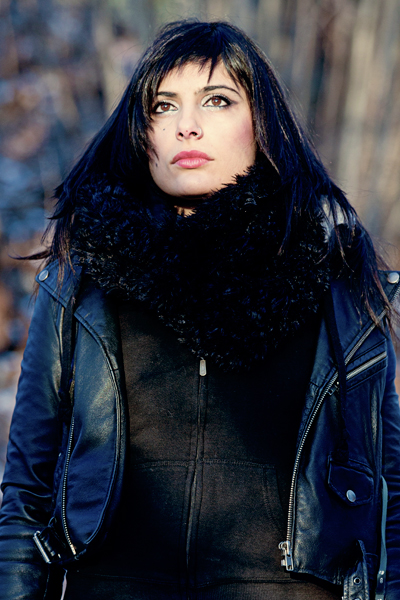 It seems on „Darkest White“ that the band is pretty angry about these world meanwhile, isn't?
It seems on „Darkest White“ that the band is pretty angry about these world meanwhile, isn't?
„It’s not about anger and hate. It’s about opening the eyes and the heart to the dark disturbing reality of being in the world. Life can be ruthless and unfair, it can seem meaningless or empty. We’re not trying to fill the void or give any answers, but I believe that exploring the darkness is crucial to understanding more of life’s mystery. We don ́t endorse or promote darkness, but we acknowledge the presence of it in every aspect of life. A life in the shadow of death can be a life full of meaning, and existence becomes all the more real when one embraces the fact that pain, emptiness, loneliness and fear are facets of our humanity that we never can ignore, run from or hide away. We bring out these aspects of life in our music, and reminds ourselves and our listeners that it is in the contrast between darkness and light, that the light radiates the most.“
You have managed to distance yourself from the very aesthetic origins of Tristania in a broad way. Did everything happen naturally?
„Yes, the evolvement of the band has been a natural process, a process that has happened for many reasons. We get older, that ́s one reason, it would be strange if a bunch of 30- somethings made the same sounding music they did in their late teens. We ́ve also seen some change of personell over the years, and every member brings something new to the table. It could be a vibe, a feeling, or a concrete musical influence. The core of Tristania’s musical soul has been intact all these years, but the way it materializes into songs and stage presence evolves and changes along with the growth of the band and the musicians. But we don ́t take lightly on the history and heritage of the band, so everything new is always seen in the bigger picture.“
Is it allowed to ask you about special musical influences in your newest songs?
„There has not been any specific musical influences that has inspired the new songs. It is more about trying to achieve a certain vibe or emotional reaction. When I write music I always search for the point where ‚raw‘ meets ‚beauty‘. It ́s not about certain notes or riffs, but it is about the way I react to a piece of music when I play it or hear it. Many times I ́ve made a certain riff or chord progression, completely without thinking about it from a theoretical angle. Later I can find out that the riff for example is very simple, almost cliché, without sounding like that at all. A friend of mine had a nice way of putting it once; he heard the demo track for ‚Year Of The Rat‘, and although the chord progression on the chorus on that song is very simple, he said ‚I can hear that you didn ́t think about which chord goes where from a theoretical point‘. And he was right, even though it is three chords, I couldn ́t even tell what they were, since I never thought about it that way, I just played it until it felt right. But of course I listen to music, a lot, so there has obviously been some inspiration here and there. I ́m not gonna say ‚this song is inspired by this, and that song is inspired by that‘, but I can tell you what I ́ve been listening to a lot the last couple of years, and everyone can listen to the album and see if you find those influences in there. Some of those are: Baroness, Gojira, Dead Can Dance, Beethoven (the symphonies), Bach (mostly piano concerts and cello sonatas), Mozart (Requiem) and Chopin among others.“
How did the works for this new album go?
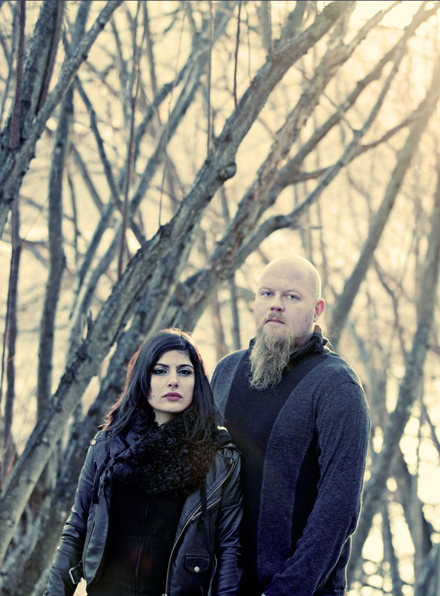 „The progression on how the album was written was mainly that I wrote a song, sometimes with vocal melodies, sometimes only instrumental. Then the rest of the guys filled in with ideas, feedback and so on, and the singers started making more vocal melodies. The melodies went over the same treatment, with ideas, criticism and feedback. So when we had 11 songs more or less finished in demo version we teamed up with producer Christer André Cederberg, and gave the songs the final push. Some of the songs went through big changes in feeling and atmosphere in these sessions, and others were just given the final polish, the last, but extremely important, 5 percent. The studio sessions were divided between three studios. We once again worked with Fredrik Wallumrød on the drum recordings, and we once again recorded the guitars and bass ourselves. Christer handled the recording of the main vocals in his studio and he also mixed the album.“
„The progression on how the album was written was mainly that I wrote a song, sometimes with vocal melodies, sometimes only instrumental. Then the rest of the guys filled in with ideas, feedback and so on, and the singers started making more vocal melodies. The melodies went over the same treatment, with ideas, criticism and feedback. So when we had 11 songs more or less finished in demo version we teamed up with producer Christer André Cederberg, and gave the songs the final push. Some of the songs went through big changes in feeling and atmosphere in these sessions, and others were just given the final polish, the last, but extremely important, 5 percent. The studio sessions were divided between three studios. We once again worked with Fredrik Wallumrød on the drum recordings, and we once again recorded the guitars and bass ourselves. Christer handled the recording of the main vocals in his studio and he also mixed the album.“
How long did the songwriting last for „Darkest White“?
„I think I made the first drafts of what to became songs for ‚Darkest White‘ over the summer of -11. The pre-prod sessions with Christer started November -12, and we continued to hone the songs all the way up until the drum recordings started early this January. So roughly 18 months is how long the songwriting process took us. I ́d wish we could work faster, but sometimes the songs just need the time to grow and live a life on their own before they are finished. If you force yourself to finish anything prematurely, you risk that the song doesn ́t reach it ́s full potential.“
With which expectation(s) have you begun the composing of the songs for these new album-release?
„To be honest we didn ́t have any spoken expectations or goals in regards to the composing. The feeling, and if the songs resonated in us were the only guideline in the beginning. We were open to let the new album take shape on it ́s own, without any ‚masterplan‘ disturbing the process. Of course, as the songs materialized, we begun to see the outline of what the album could be, and then we took more notice of where we wanted to go, and what line we should follow to make the songs connect. But this was not something we sat down and discussed beforehand, it was more a question of following the path and being true to our instincts.“
Where did the new ideas come from for your newest epic art?
„We had ideas for the feeling of the album, the concept of the lyrics and the emotional output of the music. But we left it up to Eliran Kantor, who made the cover, to create the art. He took the job very seriously, and spent a lot of time with the lyrics to decipher the album. He let his creativity work freely once he felt that he had gotten the albums soul under his skin, and the cover is a true work of art. I strongly feel that it is the best albumcover we could ever get for ‚Darkest White‘, and it adds so much depth and nuances to the lyrical and musical journey.“
What’s your personal view about the ‚artistic spirit‘ of the new album release?
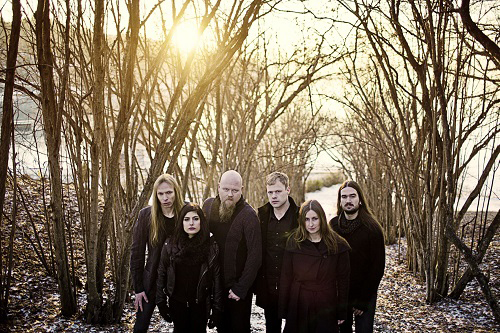 „The artistic spirit in Tristania has always been about freedom. Freedom to cross borders into new unchartered territory, freedom to go upstream, freedom to look back, freedom to reinvent ourselves. This release is no different, the ‚artistic spirit‘ is just how we want to express ourselves now, it is the perfect arena for us to be creative. ‚Rubicon‘ felt like a natural step after ‚Illumination‘. Then we wanted more Metal, more grand symphonic elements, but we wanted to keep some of the catchyness. So after ‚Rubicon‘ it definetely feels right to turn to a more twisted, dark and ‚artistic‘ side of Tristania. It ́s all about balance, and all about being true to the creative instincts. It is also a good representation of the band that we are when we are playing live. Tristania albums have always been significantly different sounding than how the band sounds live. I think that on this album we ́ve made a huge step in the direction of how we sound and look when we are playing concerts. My personal view on the ‚artistic spirit‘ of the new album is that I think art in general is so much more appealing when you are struck by a feeling that there is more than meets the eye. Art only exists in the minds of those that experience it, and that experience becomes much stronger and more intense when the subject is covered in some shroud or is somewhat distant or untouchable. Too much information, and too clear and obvious messages excludes the listeners imagination and waters down the art experience. So this way I am extremely satisfied with the ‚artistic spirit‘, both based in my personal tastes, but also based on my general view on art.“
„The artistic spirit in Tristania has always been about freedom. Freedom to cross borders into new unchartered territory, freedom to go upstream, freedom to look back, freedom to reinvent ourselves. This release is no different, the ‚artistic spirit‘ is just how we want to express ourselves now, it is the perfect arena for us to be creative. ‚Rubicon‘ felt like a natural step after ‚Illumination‘. Then we wanted more Metal, more grand symphonic elements, but we wanted to keep some of the catchyness. So after ‚Rubicon‘ it definetely feels right to turn to a more twisted, dark and ‚artistic‘ side of Tristania. It ́s all about balance, and all about being true to the creative instincts. It is also a good representation of the band that we are when we are playing live. Tristania albums have always been significantly different sounding than how the band sounds live. I think that on this album we ́ve made a huge step in the direction of how we sound and look when we are playing concerts. My personal view on the ‚artistic spirit‘ of the new album is that I think art in general is so much more appealing when you are struck by a feeling that there is more than meets the eye. Art only exists in the minds of those that experience it, and that experience becomes much stronger and more intense when the subject is covered in some shroud or is somewhat distant or untouchable. Too much information, and too clear and obvious messages excludes the listeners imagination and waters down the art experience. So this way I am extremely satisfied with the ‚artistic spirit‘, both based in my personal tastes, but also based on my general view on art.“
© Markus Eck, 16.05.2013
[ to overview ]
Multiple five-star rated PR Agency that works professionally and reliably with numerous partners in the worldwide music media.
Many years of extensive and in-depth experience in various musical fields form the basis for an individual and efficient service at Metal Message ᴳᴸᴼᴮᴬᴸ.
Main field of activity besides communication for global Public Relations are integrated Promotion Campaigns in print, online and broadcast, as well as marketing, artist management, consulting and mentoring.
Just like an exquisite manufactory - where passion meets profession!
Merch
•
Releases
•
Concerts
•
Cover Art Mediation
•
Media Area
•
Global Fame
•
Iron Talks • Podcast
ATMósferas Magazine
Bleeding4Metal
Crossfire Metal
Darkzen Dragon
Epic Metal Blog
Filthy Dogs Of Metal
Frenzy Fire
Hanf- und Wander-Metaller
Highwire Daze Online
Legacy
MetalUnderground AT
Metal Addicts
Metal Gods TV
Metal Opera
Metal Pedia
Metal Temple
Metal Titans
Pete's Rock News And Views
Powermetal DE
Stormbringer
The Cosmick View
The Murder Inn
Time For Metal
Via Nocturna
World Of Metal
X-Reviews
Zephyr's Odem
1921 Baliheadbanger
Demontre Radio
Das Metalmagazin hart&direkt
Hijos De La Luna
La Caverna De Hierro
Loud And Proud
Metal Only
Metal Tavern Radio
PowerPlant Radio NL
Radio Diabolus
PODCASTS
LABELS
Disclaimer
Impressum
Datenschutzerklärung
•
FAQ
•
Design & Programming
Help Metal Message ᴳᴸᴼᴮᴬᴸ • 𝐸𝓈𝓉. 2001 with your donation via 𝗣𝗮𝘆𝗣𝗮𝗹 to give its artist clients worldwide the most dedicated & professional support!
© Metal Message ᴳᴸᴼᴮᴬᴸ • 2001-2024 • All rights reserved
Unauthorized use and/or duplication of this material without express and written permission from this site’s author and/or owner is strictly prohibited.
Excerpts and links may be used, provided that full and clear credit is given to Metal Message ᴳᴸᴼᴮᴬᴸ with appropriate and specific direction to the original content.















